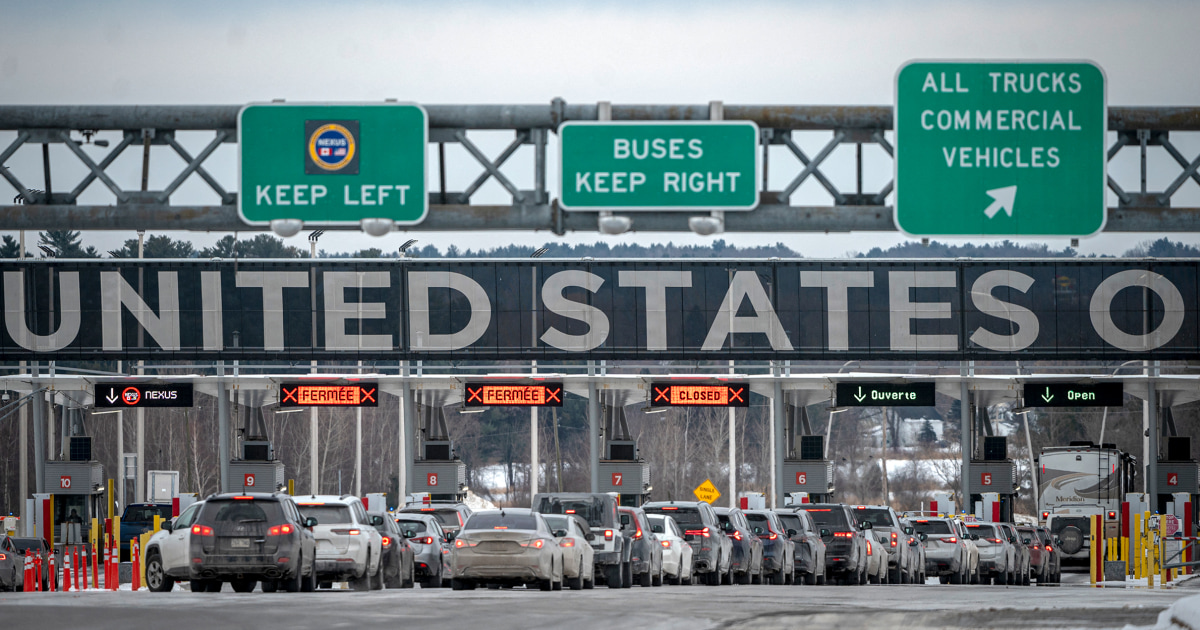
Profile
Sections
Local
tv
Featured
More From NBC
Follow NBC News
news Alerts
There are no new alerts at this time
For international tourists, traveling to the United States is looking less inviting these days.
The combination of President Donald Trump’s trade policies and hostile rhetoric toward much of the rest of the world are creating a chill in international travel to the U.S. That shift might have a significant economic impact, with one Wall Street firm projecting U.S. revenue could collapse by as much as $90 billion this year when combined with reduced travel and U.S. product boycotts.
Tourism from Canada has seen the biggest drop-off after Trump targeted the country directly through trade restrictions and indirectly by suggesting that the northern neighbor and close ally could become the “51st state” of the U.S.
Traveler data from U.S. Customs and Border Protection shows visitors coming across the northern border down 12.5% in February year over year, and off 18% for March.
Visitors from Western Europe, another traditional allied region, have also pulled back, according to the National Travel and Tourism Office, a division of the U.S. Commerce Department. Some vacationers from the most historically reliable countries of origin, like the United Kingdom and Germany, have chosen not to visit the U.S. Travel from those countries declined by as much as 29% in March.
In total, Western European visitors saw a 12% drop off in March, one of the highest on record outside of the pandemic.
“Multiple data sources are pointing at a slowdown — and there are lots of anecdotes that point to an even more severe slowdown,” said Jan Freitag, senior vice president of lodging insights for STR Global and national director, hospitality analytics for CoStar Group.
Trump has hit Western allies most directly through tariffs on autos and auto parts, as well as steel and aluminum. European imports currently face a 10% duty, though for now Trump has paused a second round of tariffs on European Union nations. He has also exempted most items from Canada — as well as Mexico — from 25% duties on imports he’d sought to impose on those two nations.
Even with those relief measures, there’s been a worsening in sentiment against the U.S. that is likely to have economic repercussions for its residents.
In a recent note to clients, analysts with Goldman Sachs said that under a worst-case scenario, the U.S. stands to lose as much as $90 billion in revenue this year from the combined impact of reduced visits and canceled purchases of U.S. goods.
“Our estimates … suggest that foreign boycotts of U.S. products will likely impose a modest drag on U.S. GDP growth in 2025, mostly driven by a pullback in foreign tourism,” the analysts said in a note dated March 31, before Trump’s “Liberation Day” announcement April 2.
“Although small, this headwind provides another reason—in addition to the more direct negative impacts of tariffs and drag on exports from foreign retaliation that are already built into our US GDP forecast—why US GDP growth will likely underperform consensus expectations in 2025.”
The negative feelings the Trump administration has engendered among longtime allies are unlikely to reverse in a short time frame even if the president relaxes his posture, said Adam Sacks, president of Tourism Economics, a unit of Oxford Economics consultancy.
“The damage has been done,” he said. While the fallout can still be mitigated somewhat if Trump softens his stance, “it will take time for things to settle and for people to re-warm toward the U.S.”
Sacks said travel groups are reporting significantly fewer bookings. However, representatives for some U.S. tourism hot spots, such as Miami and Niagara Falls, say they have yet to see major evidence that a slowdown is afoot.
David Whitaker, president and CEO of the Greater Miami Convention & Visitors Bureau, said that the full weight of the administration’s moves have hit largely after the city’s peak tourism season in winter and early spring, and that hotel bookings and room rates have held up so far. Miami is also buffeted by its diversified international visitor base and the fact that those visitors tend to be more affluent.
But he said there is still likely to be some impact in the coming weeks and months.
“Ask me again in May,” he said.
Canadians were still arriving in droves for a recent hockey game in New York against the Buffalo Sabres, said John Percy, president and CEO of Destination Niagara USA. While it’s too early to tell the precise impact on his city’s economy, any reduced spending would ripple through western New York communities in the form of reduced tax revenue that helps pay for essential services such as police and fire.
“We don’t realize the snowball effect, he said.
Rob Wile is a Pulitzer Prize-winning journalist covering breaking business stories for NBCNews.com.
© 2025 NBCUniversal Media, LLC